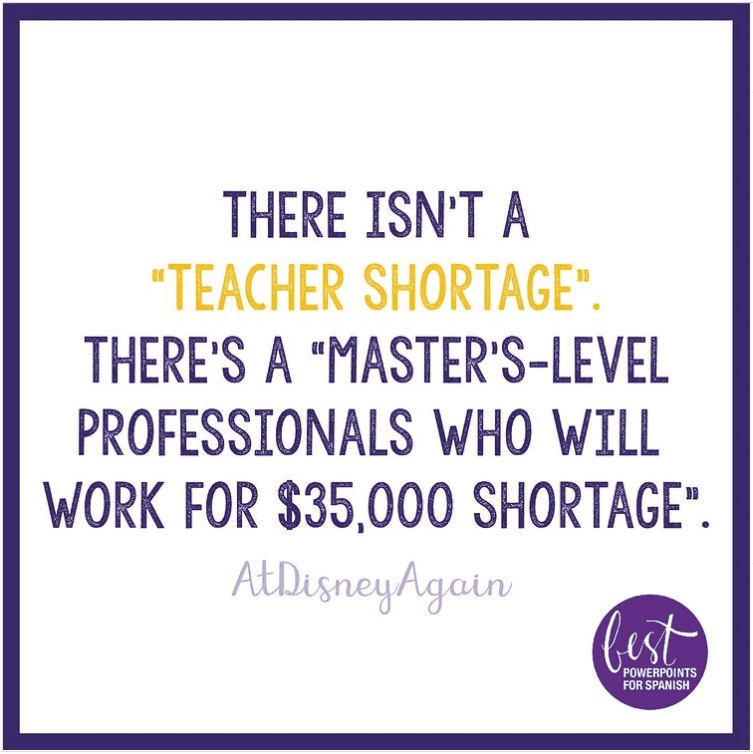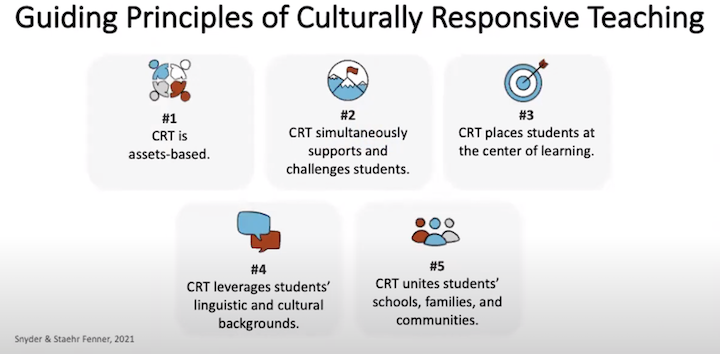Blog B.2: Teacher Shortages and States' Responses
*Note: I chose to follow the money for this article. This article is full of some great thought provoking issues facing the bureaucracy that is hitting things like Critical Race Theory, and how legislatures are making it difficult for highly educated (masters plus) teachers to remain in the work force in conservative states. I encourage you to take the time to read Joyce's article so that you can unpack it all in your own way!
The article I chose to read is titled "We Don't Need No Education: Now Arizona Says Teachers Don’t Require College Degrees" by Kathryn Joyce. Initially I was looking for titles about social justice, critical race theory, and book banning. I found some articles that I really wanted to look at, but became overwhelmed by the amount of articles in those categories. At some point I stumbled upon this one, and honestly this is a conversation I am constantly hearing about so I decided to read this article. By the end of the article I was moved to do a little more digging on this new teacher shortage.
According to Joyce, Arizona is in need of teachers. Their teacher shortage has led to Governor Doug Ducey signing into law SB 1159. This law makes it so that teachers do NOT need to have any type of degree in order to become a teacher in Arizona. According to the article the law would make it so that, "Arizona teachers will only have to be enrolled in college in order to begin teaching the state’s public school students" (Joyce). While I understand there is a teacher shortage, this seems almost negligent. Where are the teachers? Is there really a shortage? When I went to school, I was constantly told there were too many teachers, so what happened?
In December 2022, Alia Wong wrote an article for USA Today, "Overworked, underpaid? The toll of burnout is contributing to teacher shortages nationwide." This article also brings up the teacher shortage issue going on right now, and two things that I found helpful in learning were the areas of need and some of the reasons why there is a need. According to Wong, there is no national teacher shortage, but some schools and districts are suffering more than others. When it comes to the classrooms in need she states, "Special education continues to have it worst, with 7% of positions unfilled. English-language-learning programs are also especially understaffed (6%), as is computer science (5%). Areas with the fewest vacancies: social studies and English/language arts, at just 2% each" (Wong). This makes sense with my school. Everyone is getting their ESL certificate in my school. Also in my school we have 2 teams, the red team and the blue team. The red team is for Special Education and the blue team is for MLLs. If you are a teacher looking for a job, my school's red team is always in need for teachers; the reason being is that those teachers need a middle school certification in a subject area, ESL, and Special Education certificates. We have had many applicants turn us down because of the level of education they must have to be on those teams.
Wong points out multiple reasons for the teacher shortage, "Myriad reasons: low pay and morale, mounting political and academic pressures, health and safety concerns. A generation of teachers hitting or nearing retirement and another generation of prospective teachers deterred by the profession’s flailing reputation and the sacrifices it necessitates" (Wong). This is pretty accurate, speaking as an educator myself. Many of my peers in Rhode Island are leaving education for higher paying jobs with less stress, responsibilities, and less education needed. I have seen veteran teachers being told in their last 5-10 years of their career that they must go back to school for ESL certification, which has led to some leaving earlier than planned.
So far, what I gathered from Joyce and Wong is that each state needs to look at the money. If we look at Arizona, prior to signing SB 1159 the state also has been moving more into charters and voucher systems. Even though the state has a good budget in education, it is not being used to bring up the salary, which is one of the lowest in the country. Even though I want to concentrate on the money, there are other pieces at play. There is much to discuss about the credentialing of teachers and how law makers believe the more educated the individual the more woke they are; clearly there are so many cogs moving in education, politics, and society that the teacher shortage does not have just one reason nor just one way of fixing the situation.
As I continued to read up on teacher shortages I found two states or districts that are trying something different, something that makes me feel better as an educator. Columbus, Ohio is also facing a teaching shortage. Based on an article published on their local news network titled, "Capital University partners with Columbus City Schools in new program aimed to ease teacher shortage" published on May 31st, 2023, Columbus City Schools and Capital University are creating pipelines for new educators. They are not doing anything new, but they are establishing formal agreements, where Capital University students can substitute at Columbus City Schools in the day time and receive educator classes online at night. This will help ensure teacher recruitment, retention, and highly qualified status. They are calling this the Capital City Teacher Residency Program and will begin Fall 2023.
"Participants in the CCTR program have three pathways:
Post-secondary students with an associate’s or bachelor’s degree take two years of online coursework through Capital University while working in a paid position in the Columbus City Schools district.
Students with some or no university credits take requisite coursework at Columbus State Community College and then transfer for two years of residency through Capital University, allowing students to work in a paid position in Columbus City Schools during their studies.
Columbus City Schools students take two years of coursework free of charge at Columbus State through The Columbus Promise before beginning the two-year residency at Capital. Employees can take associate-level coursework at Columbus State or other higher education institutions before the two-year Capital University residency" (10 WBNS).
Another article that I found was published May 30th, 2023 about Connecticut schools facing similar issues. In "CT’s largest teachers union to unveil measures to address teacher shortage" the same issues were brought up of not having enough teachers to fill in all the vacancies. Again the state is looking into investing in teacher development and retention. "Earlier this month, the Lamont administration added to a previously announced initiative aimed at hiring and retaining teachers.
Its $3 million initiative included expanding high school programs to train teachers within their own communities, a new educator evaluation system, and additional support for staff.
Lawmakers said they are putting $150 million into the budget to help train and recruit more teachers. However, most educators pushed for increased pay. The CEA said back in March that the average salary was $47,000. It proposed raising that to $60,000" (Polansky). I found this powerful, because we shouldn't throw away all the educators that are highly qualified and able to do the job. Our state agencies needs to look at how to keep such highly trained individuals in our profession, and how to create easier paths for educators that are being asked to be so highly educated.
So what did I learn? I learned that Central Falls, RI or Providence, RI isn't alone in this exasperating teacher shortage. I learned that educators in the northern democratic states have more options on the table, for instance, the legislatures are not creating hurdles for qualified teachers to stay in the profession. I also realize that I am being paid much more than places like Arizona, even if it feels like the poverty line keeps following me each teaching step. There are options other than hiring people that do not have any background in teaching pedagogy. States like Ohio and Connecticut are finding ways to increase pay, create appropriate pipe-lines with post-secondary institutions, and working with teacher unions to move education in the right direction. My hope is that, at least in my school, we will have a teacher in every classroom at the beginning of the school year, because our students are suffering from these teacher shortages, especially in ESL and Special Education.
**This tool lets you look at teacher shortage by year and state.**
House engrossed Senate bill teacher certification; leadership (n.d.). https://www.azleg.gov/legtext/55Leg/2R/laws/0337.pdf
Joyce, K., & A version of this article first appeared in Salon. An online version remains in the Salon archives. It is being reprinted with permission. Kathryn Joyce is an investigative reporter at Salon. (2022, October 28). We don’t need no education. Rethinking Schools. https://rethinkingschools.org/articles/we-dont-need-no-education-now-arizona-says-teachers-dont-require-college-degrees%ef%bf%bc/
Polansky , R., & Raff, S. (2023, May 30). CT’s largest teachers union to unveil measures to address teacher shortage. https://www.wfsb.com. https://www.wfsb.com/2023/05/30/cts-largest-teachers-union-unveil-measures-address-teacher-shortage/
Staff, A. 10TV W. (2023, May 31). Capital University partners with Columbus City Schools in new program aimed to ease teacher shortage. 10tv.com. https://www.10tv.com/article/news/local/capital-university-creates-program-ease-teacher-shortage-in-columbus/530-2e4e6356-4cc7-41d3-a357-df005c051ef1
Wong, A. (2022, December 27). Overworked, underpaid? the toll of burnout is contributing to teacher shortages nationwide. USA Today. https://www.usatoday.com/story/news/education/2022/12/21/why-there-teacher-shortage-schools-struggled-nationwide-2022/10882103002/






Kelly, thank you for bringing this topic to your blog! The data from your resources here is shocking and honestly disheartening. To think that people who have worked hard to complete higher education are being considered "too woke" for working in public schools in some places is terrible. I will have to read this full article now!
ReplyDeleteHi Kelly! This was a great post. I can tell that you found interest in this topic and did some great research around the nationwide teacher shortage. Great perspective at the end. While we are higher paid in RI compared to states such as Arizona or Mississippi, there are still many problems that exist and teacher vacancies that need to be filled especially for our most vulnerable student populations.
ReplyDeleteHi Kelly,
ReplyDeleteWow! Awesome job. You definitely put a lot of time and effort into your post. I cannot believe that Arizona will allow people to become teachers without any type of degree. As a mom, that terrifies me! Who is teaching their youth? What qualifications do they have? How many "teachers" actually follow through and finish their degree in a reasonable amount of time? It's great to hear there are states that are trying to do better. We still have a long way to go.